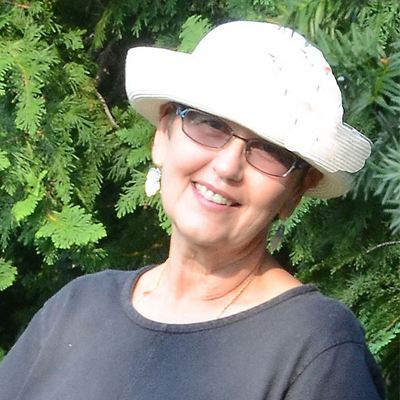Winning: Maryalice’s Story
Maryalice’s story is one of spirituality, empathy, pragmatism, purpose, and fortitude.
It begins when she adamantly states, “I don’t like the word ‘caregiver.’ It implies that I won’t be involved, won’t decide what treatments to take, what doctors to consult. It diminishes you. I like care partner. Since the day of my cancer diagnosis in June 2008, my husband has been my care partner.” She touches one of the three silver necklaces around her neck: two intertwined hearts that her husband gave her.
Maryalice Gross was on hold on the phone, waiting to make an appointment for her routine mammogram, when her hand brushed across a lump in her breast. An ultrasound and a large-core biopsy followed.
“I have cancer” was hard to say out loud at first. It meant she was sick—tough for a woman who had always taken care of others, tough for a strong woman. She scheduled surgery the day after one of her sons graduated from law school. The diagnosis, a positive sentinel node, meant that the cancer could be anywhere. Eleven lymph nodes were removed from under her arm.
The initial treatment had been tough: two surgeries, 15 rounds of chemotherapy, and 33 radiation treatments. By the third round of chemo, she’d begun to lose her hair, but rather than waiting for the rest to fall out, she asked a family member to buzz it off one July day in her backyard. She developed thrush and mouth ulcers; dropped several sizes; lost her balancing nerves and had to relearn to walk; developed lymphedema, forcing her to wear compression garments night and day; contracted fibromyalgia; developed neuropathy in both her hands and feet which, at times feels as if she is walking on broken sea shells, at other times as if pieces of rolled-up towels were between her toes, and at other times makes her unable to feel heat, turn on an oven, or hold a plate. “After you break enough plates, you realize you need different kinds,” she says ruefully.
Because her husband went to work, she went to each appointment alone. In retrospect, she thinks she should have brought someone with her or tape-recorded the instructions. Perhaps, then, she would have remembered precisely how to take her anti-nausea meds and what to expect after each round.
Maryalice’s breast cancer was in remission until January, 2011, when crushing pain sent her to the hospital for a whole body scan. The cancer had metastasized, and tumors had spread to her bones and liver. This meant more radiation, more chemo– chemo for the rest of her life.
“There is a prayer a friend sent me before my first surgery, with the words, ‘You are exactly where you are meant to be.’ That’s what I believe: this is where I am, and I am in God’s hand,” Maryalice says. “At every treatment, I thank God that we have the drugs and technology to treat cancer. I also ask God to give everyone who has cancer and other serious illnesses two hours of respite every day, two hours to sleep or enjoy family just to feel human. This has carried me through.
“If I am feeling down, I give myself 15 minutes to cry. Then I look at the clock and say, ‘You have no more time to give cancer.’ I have learned to live with how cancer has changed my life. I don’t consider cancer my journey; this is my life, and cancer is part of it. I am a strong person who can’t say no to a challenge, but I am not stronger than cancer. The only thing stronger than cancer is God, the universe, or whatever you believe in.” Maryalice glances at her hands.
“When I first got cancer, I never said, ‘Why me?’ I have a wonderful husband who is my care partner, and I knew that not everyone had that in their life. I have modified my life. I am a pragmatist and have figured out what I can and cannot do. I can figure out the house with gizmos to turn on the washer and dryer and the stove. Although I have lost my hobbies—jewelry making, knitting, weaving because of the neuropathy in my hands—I bought a camera, shaky hands or not, because I miss being creative.
“In some ways, I have compartmentalized cancer, and I have realized that everything is relative when you have cancer. Each morning that I wake up, I win. I look out the window, under the raised shade, and see the trees.” She smiles brightly. “The Cancer Support Community gave me a place to go and people to be with. I had to leave my job because I couldn’t type more than three sentences. In the beginning, you have a lot of people supporting you, but then they return to their lives, as they should.
“However Cancer Support Community is always there for us. I have participated in yoga, healthy cooking, drumming, heart rhythms, and special programs, but for me, the creative arts program is my ‘regular, can’t miss’ program. The people have become my anchors, and talking about our art lets me have the freedom to say things that I don’t say to friends.
“I am in this ‘shadowland’ because I didn’t go back to what I was before cancer and I haven’t died. I am going to live but I’m not ever going to be well again. Life is baffling, exciting, and ever changing. I enjoy so many things, just different things and it seems like every day there is some special gift for me to enjoy. I am sending out ‘live’ messages to myself and the world, and I have booked a trip for April 2013.”


